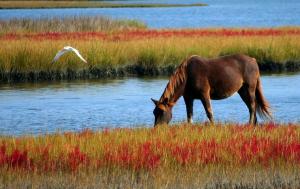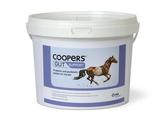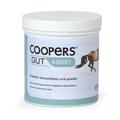Parasite Fact! Some of the gut parasites your horse picked up during summer grazing may have overwintered in your horse’s guts. During late winter/early spring these parasites become active again, having potentially devastating effects on your horse’s health.
Gut Parasites: A Closer Look
During late winter/early spring there are several gut parasites to consider. Firstly, the parasitic larvae of the small redworm larvae may have infected your horse during grazing. As the nights draw in and temperatures cool, these pesky parasites have a neat winter survival trick….. hiding in your horse! Instead of maturing to become adults, the larvae burrow into your horses intestinal lining and stay there, in an inactive state over winter.
In the late winter/early spring all the inactive larvae wake up at once! The larvae then burrow out of the intestinal lining en mass, potentially causing significant damage to your horses intestinal lining. Signs to watch out for include:
· Weight loss ( this can be sudden)
· Diarrhoea
· Colic, which can result in death.
The second gut parasite is tapeworm. You may have had tapeworm in the diary during autumn but don’t forget spring is also an ideal time to think about controlling this gut parasite. The adult worms live at a narrow join in your horse’s intestines, stealing your horses nutrients, but can lead to bigger problems if left to build up. Signs to watch out for include:
· Weight loss,
· Poor doers,
· Poor coat quality,
· Diarrhoea
· Repeating episodes of colic
As a general rule, the more parasites your horse has, the bigger the potential problem!
How can I help to protect my horse?
Plan ahead! It is important to remember that every horse and situation is unique, therefore deciding whether to test or treat for different parasites throughout the seasons should be guided by your prescriber with a risk based approach. You can view this handy risk assessment guide from https://canterforhorses.org.uk/horse-owners/ to help aid your discussions about your horse’s worm risk with your vet or suitably qualified person.
If you do need to treat your horse, for the inactive stages of small redworm, it is recommended products containing either of active ingredients fenbendazole (used daily for 5 days) or moxidectin are used. For tapeworm, products containing either of the following active ingredients are recommended: either pyrantel embonate (double dose) or praziquantel.
This information is provided by MSD Animal Health, the manufacturer of Panacur®. Copyright © 2024 Merck & Co., Inc., Rahway, NJ, USA and its affiliates. All rights reserved.
Further information is available from MSD Animal Health UK Ltd. Registered office Walton Manor, Walton, Milton Keynes MK7 7AJ, UK. Tel: 01908 685685 • [email protected] • www.msd-animal-health.co.uk
Registered in England & Wales no. 946942.
Written by: MSD (Guest Author)



